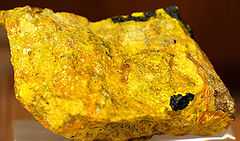Schoepite
| Schoepite | |
|---|---|
 | |
| General | |
| Category | Uranium minerals |
| Formula (repeating unit) | (UO2)8O2(OH)12 • 12(H2O) |
| Strunz classification | 04.GA.05 |
| Crystal symmetry |
Orthorhombic pyramidal H-M symbol: (mm2) Space group: P 21ca |
| Unit cell | a = 14.33 Å, b = 16.79 Å, c = 14.73 Å; Z = 4 |
| Identification | |
| Color | Amber, lemon- or sulfur yellow |
| Crystal habit | Commonly as tabular equant, to short prismatic crystals; rarely in microcrystalline aggregates |
| Crystal system | Orthorhombic |
| Cleavage | [001] Perfect, [010] indistinct |
| Tenacity | Brittle |
| Mohs scale hardness | 2.5 |
| Luster | Adamantine |
| Streak | Yellow |
| Diaphaneity | Transparent to translucent |
| Specific gravity | 4.8 |
| Optical properties | Biaxial (-) |
| Refractive index | nα = 1.690 nβ = 1.714 nγ = 1.735 |
| Birefringence | δ = 0.045 |
| Pleochroism | X = almost colorless; Y = Z = lemon-yellow to golden yellow |
| 2V angle | Measured: 89° |
| Ultraviolet fluorescence | Short and long UV = pale green |
| References | [1][2][3] |
Schoepite, empirical formula (UO2)8O2(OH)12•12(H2O)[1] is a rare alteration product of uraninite in hydrothermal uranium deposits. It may also form directly from ianthinite. The mineral presents as a transparent to translucent yellow, lemon yellow, brownish yellow, or amber orthorhombic tabular crystals. Although over 20 other crystal forms have been noted; rarely in microcrystalline aggregates. When exposed to air schoepite converts over a short time to the metaschoepite form (UO3 • nH2O, n < 2) within a few months of being exposed to ambient air.
The hardness is 2.5, density is 4.8 g/cm3, and it streaks yellow.
It was first described from specimens from Shinkolobwe mine in Zaïre in 1923,[1] several additional localities are known.
Schoepite was named to honor Alfred Schoep (1881–1966), Professor of Mineralogy at the University of Ghent, Belgium.[2]